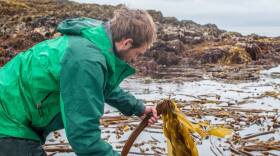A recent study done by UC Santa Barbara researchers found that long-term ocean warming is reducing the nutritional value of giant kelp.
Heili Lowman is the lead author of the study and a postdoctoral scholar at the University of Nevada, Reno. She did this research while she was a Ph.D. student at UCSB.
Lowman said her team found that the nutritional quality of giant kelp in the Santa Barbara Channel has declined over time as temperatures have steadily increased. Specifically, nitrogen content has declined by 18 percent over the last 19 years.
Lowman said researchers have known for years that there are seasonal fluctuations in the nitrogen content of giant kelp. But this long-term data shows decades of steady decline.
Lowman called this a hidden effect of climate change.

“We’re thinking about how the nitrogen is present in the surrounding sea water, how the kelp is then using it to grow and reproduce and eventually how that kelp is then feeding other populations like abalone and urchins in the ocean, which are the basis of several productive fisheries,” Lowman said.
She said this has cascading impacts because giant kelp is a primary food source for coastal fisheries’ catch. Industries could see economic impacts if kelp nutrition continues to decline.
Mammals and shore birds also depend on giant kelp for survival.
Lowman said there is still a lot of research to be done involving giant kelp and rising ocean temperatures.
“Kelp is resilient in a lot of ways and so there may as yet be things that we don’t know about how it’s adapting to warming sea water,” Lowman said.
Kyle Emery is a co-author of the study and a current Ph.D. student at UCSB. Much of his research focuses on kelp that washes ashore and its impact on the stability of sandy beach ecosystems.

He said the nutritional decline of kelp isn’t necessarily permanent. He said he hopes this research can help serve as a motivation to think about how we are addressing broader climate issues moving forward.
“In our region, even though the water is warming, the kelp hasn’t disappeared like it has in other parts of the globe," Emery said. "But there are still serious implications to warming sea water and what’s happening in the kelp forest and in these places where kelp ends up.”
Emery says there isn’t much long-term nutritional data of kelp across the globe, so it’s hard to tell if coastal environments everywhere are seeing similar impacts.





